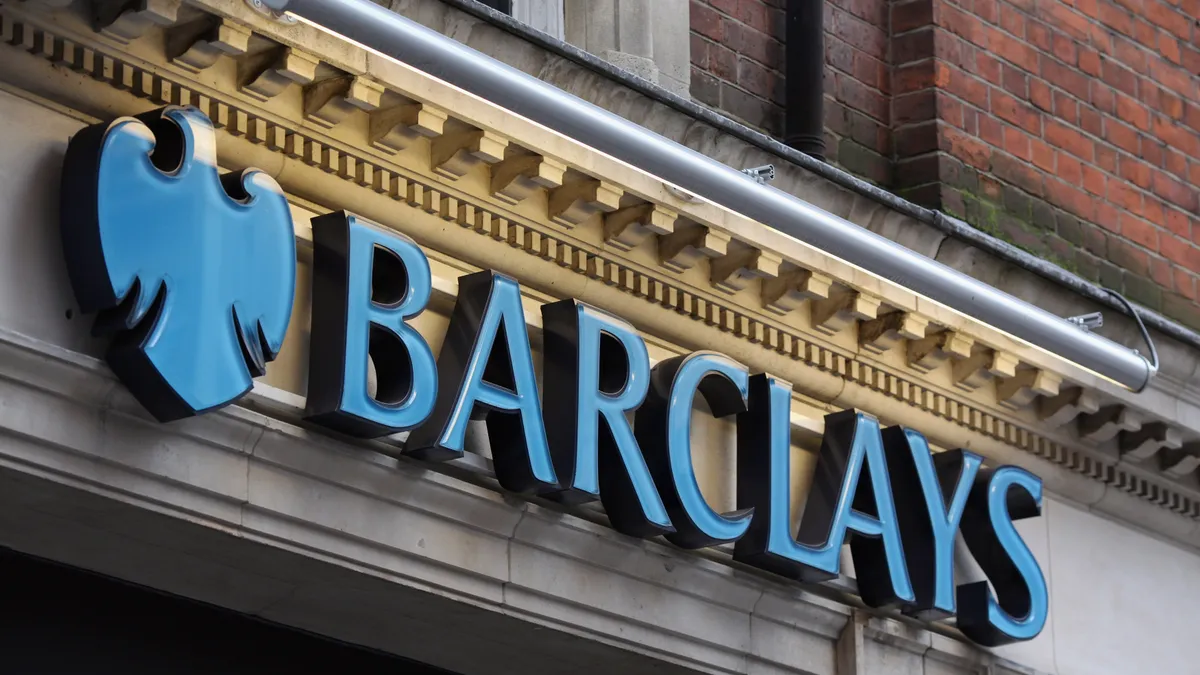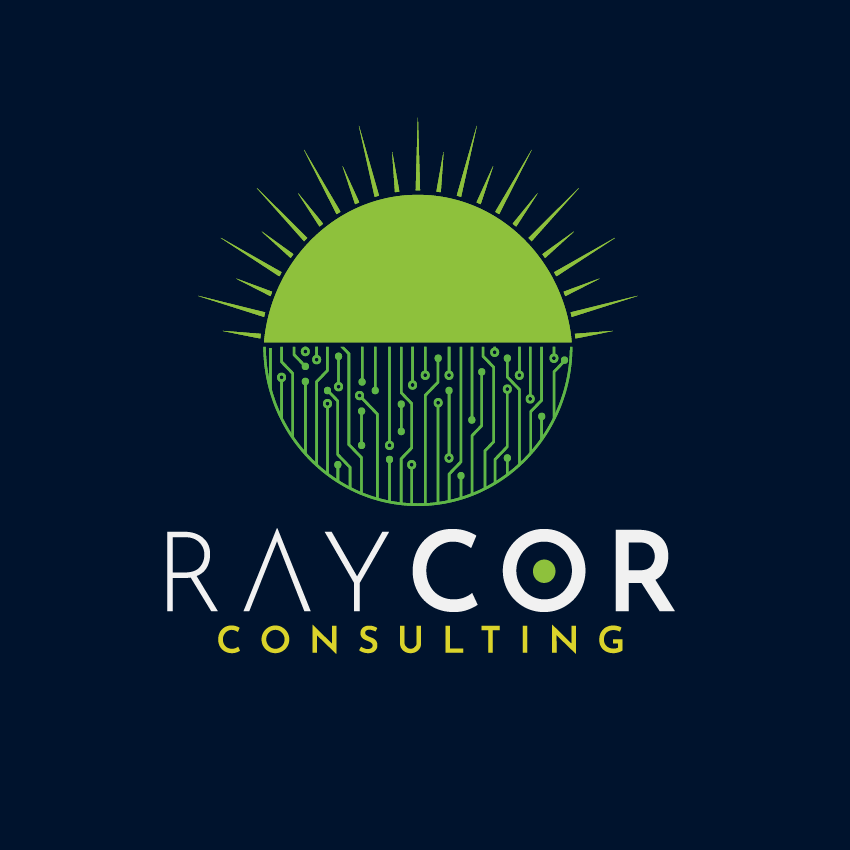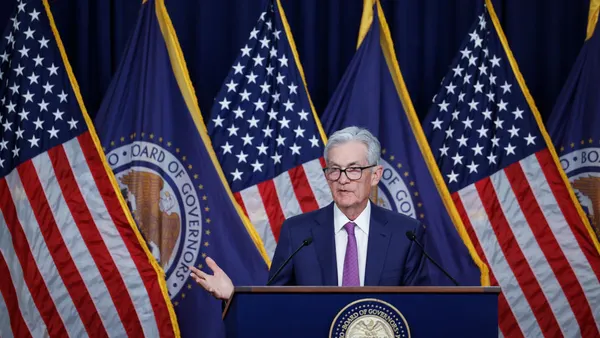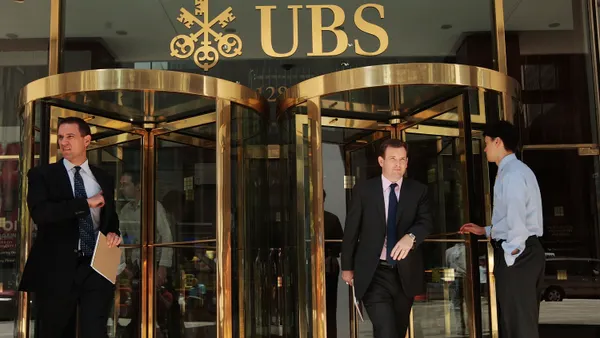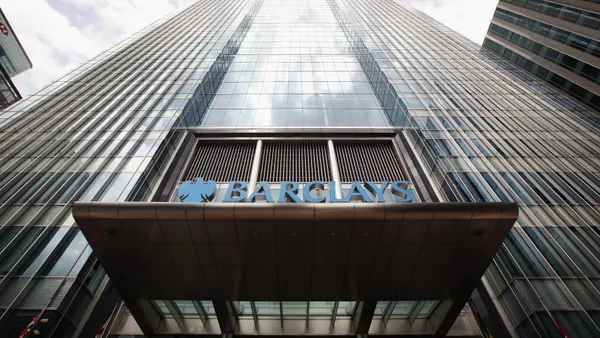Dive Brief:
- The Information Commissioner's Office (ICO), Britain's privacy watchdog, is investigating Barclays over the bank's use of software that allowed managers to measure the length of time employees were away from their desks and how long they took to finish tasks, The Telegraph reported Sunday.
- The bank monitored staff anonymously for 18 months using a program from Sapience Analytics, according to the publication. But in February, Barclays allegedly engaged an additional function in the software that let bosses track individual employees. The bank stopped the monitoring later in the month and informed the ICO of its actions after staff members criticized the move.
- Barclays faces a fine of up to $1.1 billion if the watchdog finds the bank breached privacy laws. Britain still adheres to the European Union's General Data Protection Regulation (GDPR), despite having left the 27-nation bloc this year. The rule allows companies to be fined up to 4% of global annual sales, according to Bloomberg.
Dive Insight:
This isn't the first time Barclays has attempted to monitor its workforce. In 2017, the bank installed OccupEye sensors under employees' desks that used heat and motion sensors to record how long staff members were spending at their stations.
The devices were pitched as a way for companies to see how they could reduce office space by highlighting usage trends or showing managers which workstations were unoccupied.
"The sensors aren't monitoring people or their productivity; they are assessing office space usage," the bank told Bloomberg at the time in an emailed statement. "This sort of analysis helps us to reduce costs, for example, managing energy consumption, or identifying opportunities to further adopt flexible work environments."
"A lot of employees took the sensors off and threw them away," Brian Kropp, chief of research in Gartner's human resources practice, told American Banker.
Sapience, by comparison, describes its software as offering "unprecedented visibility into how people work, with actionable insights to better manage cost and performance across teams."
The system sends employees automated admonitions if they are deemed not to have spent enough time in their work areas, and offers suggestions to boost productivity. "Not enough time in the Zone yesterday," read an assessment a Barclays employee shared with City A.M. "Tips: mute the phone, disable email/chat pop-ups, avoid breaks for 20+ minutes, 2-3 times a day."
"Employees are worried to step away from their desks, have full lunch breaks, take bathroom breaks or even get up for water as we are not aware of the repercussions this might have on our statistics," a whistleblower told the publication in February. The system allegedly logs bathroom visits as "unaccounted activity."
"The stress this is causing is beyond belief" and "shows an utter disregard for employee wellbeing," the whistleblower said.
Barclays referred Bloomberg to a statement it made in February, saying it "always intended to listen to colleague feedback as part of this limited pilot, and we have taken steps to ensure that no individual data is visible to managers."
The bank cut about 3,000 jobs in a round of cost-saving measures in the spring of 2019. Beyond that, the coronavirus pandemic, which is forcing employees to work remotely, may serve as a temptation for companies to ramp up monitoring of productivity.
Some companies may use software that keeps tabs on workers' computer and app usage, keystrokes and overall productivity. Some may monitor employees' instant messages and emails. Others may ask employees to turn on their web cameras and keep them running throughout the workday.
In the first eight weeks of the pandemic, Gartner reported that about 16% of companies bought software to track remote employees' use of their computer and applications, according to American Banker. In the same time frame, 40% of monitoring software maker Teramind's 2,000 clients requested additional licenses to track more users, the publication reported.
About a quarter of employees, according to an April survey by YouGov, LinkedIn and USA Today, said they felt less productive at home than in the office.
An important distinction in monitoring productivity is that staff members need to know what to expect of their employer regarding privacy.
"People expect that they can keep their personal lives private and that they are also entitled to a degree of privacy in the workplace," a spokesman for the ICO told The Telegraph in a statement. "If organizations wish to monitor their employees, they should be clear about its purpose and that it brings real benefits. Organizations also need to make employees aware of the nature, extent and reasons for any monitoring."
But the justifications for such monitoring get grayer outside of work.
"The farther you are away from monitoring activity that could reasonably be related to their job … it's problematic," Trina Fairley Barlow, a partner at Crowell & Moring, told American Banker.



